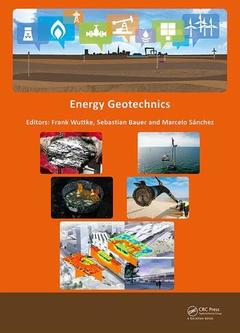Energy Geotechnics Proceedings of the 1st International Conference on Energy Geotechnics, ICEGT 2016, Kiel, Germany, 29-31 August 2016
Coordonnateurs : Wuttke Frank, Bauer Sebastian, Sanchez Marcelo

Energy Geotechnicsincludes 97 technical papers presented at the 1st International Conference on Energy Geotechnics (ICEGT 2016, Kiel, Germany, 29-31 August 2016). The contributions provides significant advances and critical challenges facing the areas of fundamentals, constitutive and numerical modelling, testing techniques and energy geotechnics applications.
Energy Geotechnics contains seven regular sessions and six minisymposia, with contributions on discrete and continuum based modelling as well as investigations based on experimental studies at various scales. The papers on discrete and continuum based modelling examine the behaviour of gas hydrate sediments, cyclic and Themo-Hydro-Mechanical (T-H-M) modelling of energy piles, non-linear behaviour of energy geo-storage and geo-structures, deformation of geomaterials, modelling of borehole heat exchangers and energy walls, analysis of hydraulic fracturing and discontinuities in reservoirs, engineering problems involving gas hydrates sediments, and modelling of environmental impact of energy geotechnical processes.
Frank Wuttke is professor and head of Geomechanics and Geotechnics at the Institute of Geoscience of Kiel University since 2013. He studied civil engineering, obtained his PhD and habilitation at the Bauhaus-University Weimar, Germany. His expertise lies in the experimental developments in material design for energy geotechnic structures, the behavior of unsaturated soils, developments in soil-structure-interaction, process monitoring methods and material identification. His working field includes dynamic material behavior, wave propagation and dynamic soil-structure interaction. Currently, he actively works in the developments of energy geostorage systems and numerical simulation of microstructure based coupled thermo-hydro-mechanical behavior of geomaterials including fracture modeling. He is member of different national and international task forces in geotechnical and energy-geotechnical fields.
Sebastian Bauer is professor and leader of the Geohydromodelling group at the Institute of Geosciences of Kiel University (Germany) since 2007. He studied Physics and obtained his PhD and habilitation in Geosciences at the Centre of Applied Geosciences, Tuebingen University (Germany). His expertise is the analysis and numerical simulation of coupled non-isothermal multiphase fluid flow and reactive transport processes in subsurface porous media. Application areas include reactive transport at contaminated groundwater sites, heat and energy storage in the subsurface, shallow and middle deep geothermal use, geological CO2 sequestration, nuclear waste storage and karst genesis simulations. His special interest is the coupled phenomena encountered in these subsurface application areas and their representation in numerical codes and applications. He has coordinated large joint research projects and is currently coordinator of the ANGUS project on subsurface energy storage.
Marcelo Sánchez was appointed as an a
Date de parution : 08-2016
17.4x24.6 cm
Disponible chez l'éditeur (délai d'approvisionnement : 14 jours).
Prix indicatif 244,87 €
Ajouter au panierThèmes d’Energy Geotechnics :
Mots-clés :
GHE; thermal; Kind Kind; conductivity; GSHP System; tolerant; Fun Fun Fun Fun Fun; water; Cryogenic Fracturing; pore; Kind Kind Kind; pressure; Tolerant Tolerant Tolerant; piles; Finite Element Software COMSOL Multiphysics; patient; Pore Pressure; positive; Tolerant Tolerant Tolerant Tolerant; role; Heat Pump; Kind Kind Kind Kind Kind; Role Model Positive Role Model; Tolerant Tolerant; Positive Role Model Positive Role; BHE; Gas Hydrate Formation; Subset Simulation; Boom Clay; Kind Kind Kind Kind; Gas Hydrate; Moisture Content; Understanding Understanding Understanding; Attitude Positive Attitude Positive Attitude; Tri-axial Loading



